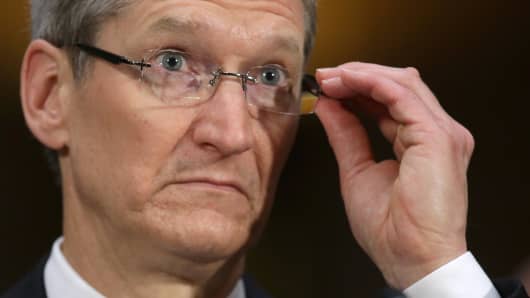- "Tech companies must continue to push back on Chinese suppression of free expression." -- Vermont Sen. Patrick Leahy.
- Leahy, a Democrat, along with Texas Republican Sen. Ted Cruz, probed Apple for details on Chinese ties

America's tech Quisling
Apple CEO Tim Cook's recent remarks at a conference in China are drawing criticism from U.S. senators, including one who worries that the tech giant is not fulfilling its "obligation to promote free expression and other basic human rights."
The comments have fanned the flames of a relationship that's already facing scrutiny in Congress.
Vermont Sen. Patrick Leahy, a Democrat, along with Texas Republican Sen. Ted Cruz, previously criticized Apple in October after reports that that the company removed VPN apps from the China App Store to comply with Chinese regulators.
When asked to provide a statement condemning the Chinese government's censorship, Apple told the senators that "actions are our most powerful statement."
Then, Cook made a surprisingly high-profile appearance over the weekend at the World Internet Conference in China, where he reportedly said that Apple and China "share" a vision for a "digital economy for openness" and "a common future in cyberspace."
After Cook's remarks at the trade show, Leahy said in a statement to CNBC: "American tech companies have become leading champions of free expression. But that commitment should not end at our borders. ... Global leaders in innovation, like Apple, have both an opportunity and a moral obligation to promote free expression and other basic human rights in countries that routinely deny these rights."
Leahy maintained his call for Apple to challenge Chinese "suppression."
"Apple is clearly a force for good in China, but I also believe it and other tech companies must continue to push back on Chinese suppression of free expression," Leahy said.
Apple is one of the most influential American technology companies in China — Google and Facebook, for example, have limited services there, and Apple is one of the few consumer electronics brands that sells a lot of products during Chinese shopping holidays like Singles Day.
Apple was not available to comment on Leahy's response to the letter.

Then, Cook made a surprisingly high-profile appearance over the weekend at the World Internet Conference in China, where he reportedly said that Apple and China "share" a vision for a "digital economy for openness" and "a common future in cyberspace."
After Cook's remarks at the trade show, Leahy said in a statement to CNBC: "American tech companies have become leading champions of free expression. But that commitment should not end at our borders. ... Global leaders in innovation, like Apple, have both an opportunity and a moral obligation to promote free expression and other basic human rights in countries that routinely deny these rights."
Leahy maintained his call for Apple to challenge Chinese "suppression."
"Apple is clearly a force for good in China, but I also believe it and other tech companies must continue to push back on Chinese suppression of free expression," Leahy said.
Apple is one of the most influential American technology companies in China — Google and Facebook, for example, have limited services there, and Apple is one of the few consumer electronics brands that sells a lot of products during Chinese shopping holidays like Singles Day.
Apple was not available to comment on Leahy's response to the letter.

